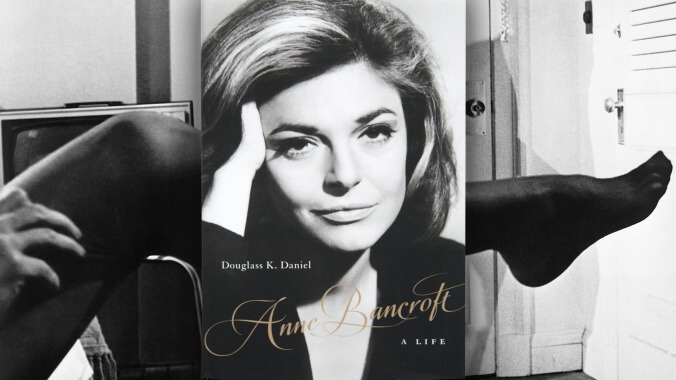Graphic: Nicole Antonuccio
The great thing about The A.V. Club’s Random Roles feature—the guiding principle, really—is the idea that the actors below the top tier of the A list are just as deserving as any other star of having their stories told. In fact, they’re usually better sources for show biz gossip, as character actors can and usually do work across genres and styles, take direction from filmmakers up and down the quality spectrum, and generally lurk in the background, building up their banks of anecdotes.
Anne Bancroft, the subject of a new biography by Douglass K. Daniel, would hardly be the most obscure Random Roles subject (she died in 2005), but one can imagine how she’d crush such a piece. She worked with Henry Fonda early in her career and with John Ford late in his; she won acclaim on stage and onscreen and also acted opposite a guy in a gorilla suit; and she played emotionally draining roles while being married to perhaps the biggest goofball in Hollywood history. Just as importantly, she was clear-eyed about her craft, about aging, and about the industry she worked in, ringing the bell about opportunities for women and industry sexism decades before these became common causes (Bancroft’s sole directing credit, 1980’s Fatso, was the first major studio film to employ a female cinematographer). Unfortunately, most people now can only name three things about her, if that, and probably in this order: she played Mrs. Robinson in The Graduate, she was married to Mel Brooks, and she won an Oscar for her role as Helen Keller’s teacher in The Miracle Worker.
Imagining the stories and drama behind this life only makes Anne Bancroft: A Life suffer in comparison. The book doesn’t want for chronological details, but it’s missing the kind of spark of insight that distinguishes great biographies.
There’s a moment in the book when Bancroft is acting in a play (A Cry Of Players) opposite Frank Langella, then a newcomer whose performance was so commanding the producers gave him final bow. Hesitant to offend his more-famous costar, Langella asked Bancroft’s permission to make the change. She responded, “That’s the way it’s gonna be… It’s your show, and I’m gonna look like the gracious star giving it up to the new guy. Now get the fuck out of here and let me get dressed.” The line arrives like the snap of a whip in the middle of this book; up until then, a reader could scarcely know of her sardonic tone, or even that she was the kind of person to use profanity. Her life is here, in other words, but little of her personality; tellingly, the Langella anecdote is pulled from his own memoir.
The sense of a person you get from any kind of first-person narration is missed here, and it’s likely that Daniel’s project could only be so good once Brooks declined to participate. It doesn’t help that their son Max (the author of World War Z) and Bancroft’s sister also declined. Presumably, that rejection chilled a lot of would-be sources; even though the book is mostly a lauding portrait, far from a hatchet job, it doesn’t seem like the author got to speak with many people who knew his subject closely. And those who do go on the record appear so cautious about presenting her in a negative light that nothing we learn feels very distinct. “She hated having to give up her time with her family and Mel” while she was working, one director recalls. “But at the same time she loved it.” No doubt her feelings on this were complex, but there’s no insight in what we’re given. As exhaustive as it is in terms of her career, Anne Bancroft: A Life nevertheless feels pretty cursory for those who want to understand her more deeply.
As Daniel is forced to rely on secondhand sources and old interviews—something Bancroft disliked doing and was private in—the depiction inevitably comes off as dry. It’s a problem when one of the central figures of your book is Mel Brooks, and not even Mr. Personality himself pops off the page (how can he, when we’re missing his own voice?). As a more internal and subtle person, Bancroft herself barely registers. One longs to hear her own words on these topics, not just giving her impressions on the icons she worked with, but explaining how her views on the industry and her career developed and evolved. At the close of the book, she seems all the more distant for the reader’s ability to rattle off facts about her while still feeling like they know nothing.
Purchasing Anne Bancroft: A Life via Amazon helps support The A.V. Club.


 Keep scrolling for more great stories from A.V. Club.
Keep scrolling for more great stories from A.V. Club.